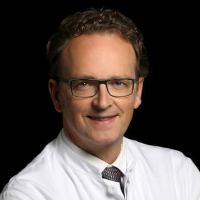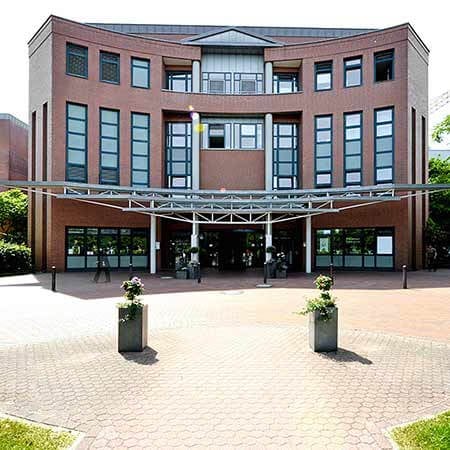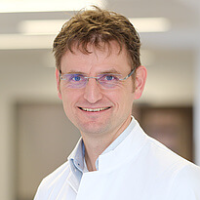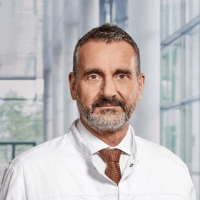Mitral Valve Stenosis — Mitral Valve Replacement: treatment in the Best Hospitals of Germany
Treatment prices are regulated by national law of the corresponding countries, but can also include additional hospital coefficients. In order to receive the individual cost calculation, please send us the request and medical records.

Department of Cardiothoracic Surgery
According to the Focus magazine, the Department of Cardiothoracic Surgery ranks among the top German medical facilities specializing in the surgical treatment of diseases of the cardiovascular system and lung cancer! The department offers the full range of surgical services for the treatment of diseases of the cardiovascular system, respiratory tract, including heart and lung transplantation, artificial heart implantation. The therapeutic options include aortic surgery, coronary artery bypass grafting, transplantation surgery, surgical treatment of heart rhythm disorders (arrhythmias), minimally invasive surgery, surgical treatment of the heart valves, including reconstructive interventions. All operations are performed using state-of-the-art technology and in accordance with the current recommendations of professional societies.






Department of Cardiac Surgery
The Department of Cardiac Surgery provides a full range of surgical treatment in its area of specialization. Special emphasis is placed on heart valve repair and replacement surgery, coronary artery bypass grafting, thoracic aortic surgery, adult congenital and acquired heart disease surgery, pacemaker and defibrillator implantation, and artificial heart implantation for severe heart failure. Many heart operations are performed using minimally invasive techniques, which has a positive effect on the healing of the surgical wound. Minimally invasive cardiac procedures also reduce surgical risks and contribute to a rapid recovery of the patient in the postoperative period. Surgical treatment of cardiac pathologies is performed in advanced operating rooms equipped with the latest technology. The cardiac surgeons of the department successfully perform routine and complex surgical procedures, saving the lives of thousands of patients. The specialists work in accordance with current clinical protocols and follow the recommendations of the German Society for Thoracic and Cardiovascular Surgery (DGTHG).


Department of Cardiothoracic Surgery and Vascular Surgery
The Department of Cardiothoracic Surgery and Vascular Surgery provides effective surgical treatment for diseases of the heart, respiratory system, and blood vessels. The team of cardiac surgeons operates on patients with heart valve pathologies, coronary heart disease, heart failure, and heart rhythm disturbances. In the field of thoracic surgery, the key focus is on the surgical removal of lung tumors and lung metastases. The specialists in this area also perform surgery to repair chest wall deformities. In the field of vascular surgery, interventions for abdominal and thoracic aortic aneurysms are most often performed here. The department's vascular surgeons are also exceptionally competent in the treatment of peripheral occlusive arterial disease. A great advantage for the department's patients is that almost all surgical interventions are performed using minimally invasive techniques, so there is no need for a long postoperative recovery. The department's operating rooms are equipped with state-of-the-art technology. This allows for effective and safe treatment. The priority is always personalized medical care for patients.






Mitral stenosis is a rare acquired heart disease that develops due to rheumatism. It can also be caused by age-related heart valve degeneration with leaflet calcification. One treatment option with a 100% success rate is heart valve replacement surgery.
Content
The operation is most often performed using open techniques with a thoracotomy. Instead of the patient's own damaged valve, the new artificial one, which can be biological (in the elderly) or mechanical (in young patients), is implanted in the patient. In some cases, minimally invasive procedures can be performed.
You can seek medical attention at the University Hospital Oldenburg, the University Hospital Essen, or the University Hospital Ulm.
The specialists at the Booking Health company will take care of all the arrangements for your trip. We will make contact with the hospital administration, schedule an appointment for you on your preferred dates, and translate your medical records into German. We will also book airline tickets and a hotel for you. Your personal coordinator will meet you at the airport, take you to the hospital by car, and support you throughout the entire treatment period.
Who may need heart valve replacement surgery?
Mitral valve replacement surgery in Germany is not considered a first-choice treatment method. It is performed very rarely in the case of heart valve stenosis.
Balloon plastic surgery is considered the main treatment option. Cardiosurgery doctors perform this procedure from the inside of the blood vessels through a small incision in the groin. This treatment method provides patients with a shorter recovery time, and the success rates are not worse than those of open surgery.
If the anatomy of the heart valve is unfavorable for a percutaneous procedure, mitral valve stenosis treatment in Germany is carried out using mitral valve repair during open surgery.
In the most severe cases, when the heart valve and subvalvular apparatus are largely destroyed, the leaflets are calcified and immobile, stenosis is combined with mitral valve insufficiency, and the subvalvular apparatus is damaged, patients have artificial mitral valve implantation.
How is the operation performed?
Mitral valve replacement is an open surgical procedure involving a thoracotomy and connecting the patient to a heart-lung machine.
When performing surgery, a doctor places a prosthesis in the patient's heart to replace the patient's own damaged mitral valve. The prosthesis can be biological or mechanical. The choice largely depends on the patient's age.
Young people are given mechanical prostheses because their service life is practically unlimited. Bioprostheses are more preferable for elderly patients because they improve hemodynamics and do not require long-term treatment with anticoagulants, but they wear out faster as heart valve dysfunction may develop in 10-20 years.
You can undergo your mitral valve stenosis treatment at one of the hospitals with cardiosurgery departments abroad. You are welcome to choose the most suitable medical care program through the Booking Health service. On our website, you can find the best cardiosurgery departments in Germany, find out the surgical treatment cost, and compare prices at different clinics. Our specialists will help you select a specialized Heart Surgery Center and arrange your trip.
Authors:
The article was edited by medical experts, board-certified doctors Dr. Nadezhda Ivanisova and Dr. Vadim Zhiliuk. For the treatment of the conditions referred to in the article, you must consult a doctor; the information in the article is not intended for self-medication!
Sources:

